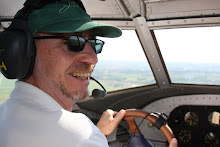Cell biologists can mix and mangle metaphors with the best of them. When they talk about "upstream" and "downstream," it's not rivers they have in mind by cell signaling "pathways." In my hiking days, I never remember setting off "upstream" on a trail unless it was raining extremely hard. Yet in a cell signaling pathway, upstream is cause. Downstream is effect. The usual approach to blocking an unfortunate downstream outcome like cancer is to go upstream as far as possible to dam the source. The problem is that signaling pathways are not always linear. If they are rivers, they end like the Mississippi in a vast delta of outcomes. Perhaps major signaling pathways are more like railroads that rivers. Because you get on the train in Minneapolis doesn't mean you're getting off in New Orleans.
Not to torture these poor metaphors any further but Amy Tang, a researcher at the Mayo Clinic College of Minnesota, who presented here at ASCB on Sunday suggested to me that signaling pathways are more like hub airports than railroad stations. Once a signal flies in on Pathway Airlines, there are many places it could fly to next. For this reason, Tang's work on highly aggressive pancreatic has looked "downstream" in the RAS pathway, a pathway often associated with cancer. Her aim is to block only those RAS signals/flights connecting for a cancer final destination. Canceling only those flights would be much more effective in her strategy.
Tang's results in stopping pancreatic cancer in tissue cell culture by blocking one of the RAS pathway's downstream components, the ubiquitin ligase SIAH, were nothing short of astonishing, she told the journalists on hand. The full story can be read by following this link:
https://www.ascb.org/ascbsec/press/embargo/ASCB-pressbook08_Tang.pdf
Monday, December 15, 2008
Upstream, downstream: Amy Tang, Mayo Clinic School of Medicine
Subscribe to:
Post Comments (Atom)

No comments:
Post a Comment